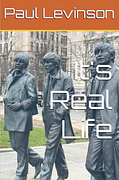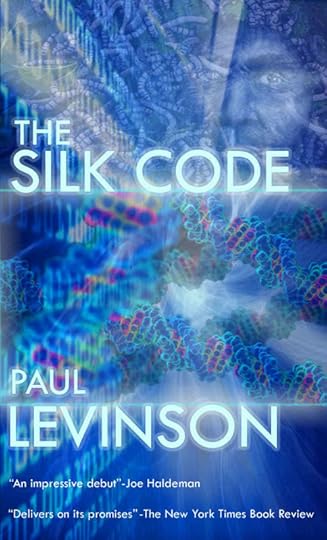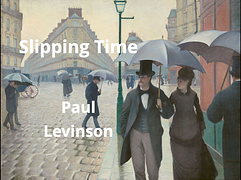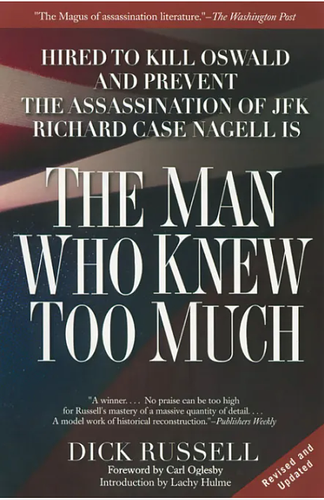Paul Levinson's Blog: Levinson at Large, page 26
December 23, 2023
Maestro: The Memorable and the Missing
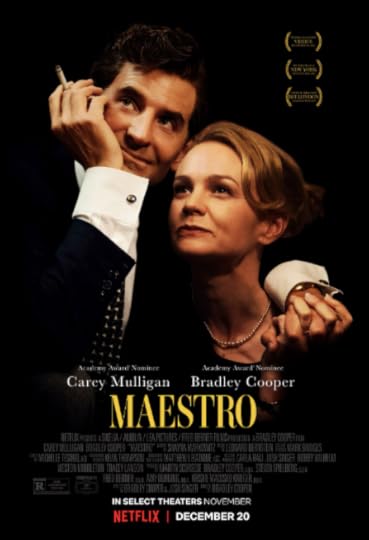
Let me start with what I really liked about Maestro, the biopic about Leonard Bernstein that went up a few days ago on Netflix, after opening in theaters in November.
Bradley Cooper's performance as Bernstein was tour-de-force, an incandescent, stunning rendition of how music inhabited, animated, catapulted the composer and even more so the conductor. I've never seen anything quite like it on the screen. Memorable is really too weak a word to describe it.
But here's what was missing for me: There was no mention of Bernstein's 1967 CBS special Inside Pop: The Rock Revolution. That TV program was a breakthrough in television and in popular cultural history. The Beatles didn't need Bernstein to tell us how great and original they were. Everyone with any ears worth having knew that already. Same for Bob Dylan, The Beach Boys, The Rolling Stones. The Byrds, The Left Banke, Janis Ian, and other recording artists Bernstein featured on the program. We already knew them, too. And if we had any knowledge and appreciation of classical music, we already had come to the conclusion that this kind of rock and folk rock music in some ways exceeded classical music as pathways to our hearts and souls. And would continue to do so into the future. But, Bernstein's CBS special was a welcome and crucially important signal anyway. It broadcast a statement that still feels fresh today: music does not need to be orchestral and written in the past to be eternal.
And yet there was no mention of this at all in the movie. All the more surprising given that David Oppenheim, prominently featured in Maestro as one of Bernstein's male lovers, co-wrote Inside Pop with Bernstein and was its producer.
And that's not all. West Side Story is recognized as one of the greatest musicals of the 20th century. That one musical -- because of its lyrics as well as its music -- probably has had more impact on the world than most of Roger and Hammerstein's wonderful musicals put together. You hear some of the instrumental riffs from West Side Story in the background at one point in Maestro, and the famous interview with Bernstein and his wife Felicia on Edward R. Murrow's Person to Person is portrayed in the movie with a brief mention of West Side Story and Stephen Sondheim (Sondheim was not mentioned nor was the name of the musical in the actual 1955 interview). But that's it for Sondheim in Maestro. No short scene of him writing the lyrics or discussing the words put to music in West Side Story with Bernstein. Sondheim is thanked by the producers of Maestro in the credits but has nearly zero presence in the movie. Why was that?
The movie is somewhat controversial in its depiction of Bernstein's bisexuality. He is depicted as genuinely loving his wife, passionately kissing her as he rushes offstage after his tempestuous conducting, and siring their children. But he also flirts with men all the time, seductively massages David Oppenheim's foot, and is seen in bed with a male lover at the beginning of the movie. Other than the fact that he had children, who knows if all of those interactions were an accurate portrayal of Bernstein's sexuality, if he was equally at home with either gender in bed, and if not, which one had greater carnal appeal. So I'll confine myself to saying the whole gamut was very well acted in the movie.
And I'll hope to someday see another biopic of Bernstein that explores and presents a fuller tableau of this genius's extraordinary contribution to the world.
======
an alternate history story about The Beatles
get the paperback or Kindle here
or read the story FREE here
December 22, 2023
Slow Horses 3.5: Winners and Losers, Part 1
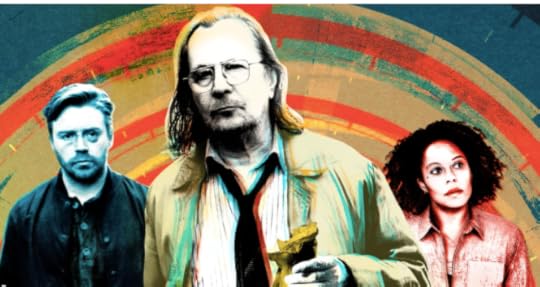
[Spoilers ahead ....]
Well, I was right that if any one of the four inside the Park would be killed in the savage attack launched by Tearney, it would be Ben Dunn. And indeed he was, at the very end of the great, action-packed (as they say) episode 3.5 of Slow Horses on Apple TV+. He was the brother of the woman killed in the first episode of this season, so his death completes the elimination of the Dunns. I'm tempted to say the Dunns are done, and apparently I just did.
This episode ends on a cliffhanger, with the question of who among our heros or anti-heroes will be gunned down or otherwise killed next week. Before I offer my opinions, I'm happy to say that I think the chances of the three survivors surviving are a lot better than they were at the end of last week's episode.
First and foremost, the bloodlust of narrative-dictates in television drama has been satisfied with the death of Dunn. Had every one of the four survived, that would have strained the credibility of the story on our screen.
Second, and less important, there are reinforcements either already in play or moving into play. Marcus and Shirley are in the inside, and neither one is a slouch. Lamb and Catherine are on their way, and certainly neither of them are slouches, either. Even Ho is on his way, and well ... he's better than nothing. Maybe a lot better. I'm not sure how he is with guns, but he's smart, for sure.
So who will be alive at the of the season four final next week? I'm thinking everyone of our team, inside and out. And Donovan, too. And if someone winds up dead? I'm thinking that will most likely be Duffy, and an outside chance Tearney (by Taverner). It's a fate that both of them eminently deserve.
See also Slow Horses 3.1-3.2: Beatles Level ... 3.3: The Meaningful Difference Between "The" and "A" in the UK ... 3.4: "Clear the Board"
And see also Slow Horses 2.1-2.2: Do Horses Eat Ramen? ... 2.3: Faster Than You Think ... 2.4-2.5: Lamb Firing On All Cylinders ... Slow Horses 2.6: Heralds of Humiliation
And see also Slow Horses 1.1-2: Fast-Moving Spy Thriller ... Slow Horses 1.3: The Fine Art of Bumbling ... Slow Horses 1.4: Fine New Song by Mick Jagger ... Slow Horses 1.5: Did You Hear the One About the ... Slow Horses 1.6: The Scorecard
For All Mankind 4.7: Dev on Mars
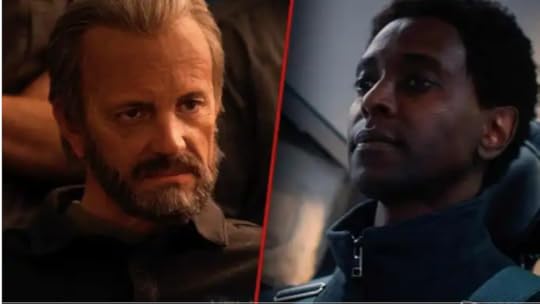
Well, I was waiting for Dev to have a major role in this season of For All Mankind on Apple TV+, and in episode 4.7 he gets it.
He's the first person person we've seen who wants to spend the rest of his life on Mars. He made that clear in a previous episode this season. And that means he thinks differently from everyone else. He's truly a person of the future.
[Spoilers ahead ... ]
The alliance he makes with Ed Baldwin at the end of the episode shows Ed feels the same way about Mars. That, indeed, is why he's already stayed there so long. His leadership of the strike, and his opposition to Poole, were rooted in his view of himself as a Martian, whether he was fully aware of that or not. NASA and everything else that comes from Earth is increasingly something that literally and figuratively come from a different world.
About the strike, I'll just throw in my two cents that it was wrong to remove a crucial piece of equipment. There's a fine line in a strike between refusing to work and damaging equipment. And though the people at the site were wrong to try make the equipment work anyway without that crucial part, I think the blame for the explosion is with whoever removed it in the first place.
Last point I'll make about this important episode is it's good to see Margo back in Houston, however uncomfortable she -- and Aleida -- may feel about that. I have a feeling good things for the human species will come from it.
See also For All Mankind 4.1: Back in Business and Alternate Reality ... 4.2: The Fate of Gorbachev ... 4.3-4.4: The Soviet Union in the 21st Century, On Earth and Mars ... 4.5: Al Gore as President and AI ... 4.6: Aleida and Margot
And see also For All Mankind 3.1: The Alternate Reality Progresses ... 3.2: D-Mail ... 3.3-3.4: The Race
And see also For All Mankind, Season 1 and Episode 2.1: Alternate Space Race Reality ... For All Mankind 2.2: The Peanut Butter Sandwich ... For All Mankind 2.3: "Guns to the Moon" ... For All Mankind 2.4: Close to Reality ... For All Mankind 2.5: Johnny and the Wrath of Kahn ... For All Mankind 2.6: Couplings ... For All Mankind 2.7: Alternate History Surges ... For All Mankind 2.8: Really Lost in Translation ... For All Mankind 2.9: Relationships ... For All Mankind 2.10: Definitely Not the End
Paul Levinson's books ... Paul Levinson's music
December 19, 2023
Podcast Review of The Way Home season 1
Welcome to Light On Light Through, Episode 365, in which I review the first season of The Way Home on Hallmark TV.
Read this review.
Links to some of what I mentioned in the podcast:
review of Chris Cosmain's time-travel novel Novikov Windows Sister Hazel All For You Maria Tayler Pens Everything I WantedPaul Levinson's books ... Paul Levinson's music
December 18, 2023
The Way Home: Somewhere Between Outlander and The Time Traveler's Wife

So, I got the email from TVLine yesterday, alerting me to Rebecca Iannucci's 10 Hidden Gems You May Have Missed From This Year’s TV, and was delighted to find The Way Home on the Hallmark Channel on the list of ten, starting with this comment, "Scoff at a Hallmark Channel series’ inclusion on this list if you must, but we were quickly captivated by this time travel drama".
Now, I can't remember the last time I watched anything on Hallmark, if ever, but I was delighted because I'm always up for a time travel movie or TV series I haven't seen before -- time travel is my favorite genre as a reader, viewer, and author (alternate history is a close second, but the two are closely related) -- and I enjoyed The Way Home so much, I binged (the best way to see a TV series) all ten episodes of the first season yesterday, and eagerly await the second season that will start rolling out on Hallmark on January 21.
I'd say the series is somewhere between Outlander and The Time Traveler's Wife, high praise in my book. Like those two series, The Way Home is science fantasy. No time machine or black hole in space is in evidence. No person or group is apparently engineering the time travel. Just a pond with a mind of its own up in Canada.
Now when the mechanism of time travel is fantasy rather than science -- clicking your heels together three times like Dorothy -- that puts a lot of pressure on the narrative to excel in other areas. And that's what The Way Home does, in all kinds of ways. It has a refreshing pop cultural savvy. "There is no way that guy becomes President," Elliot says (has to be about Trump) in 1999, when he asks teenaged Alice (who has traveled from 2023 to 1999) to tell him "something else" about the future. Later, Elliot makes a Marty McFly reference, Alice makes a face like she doesn't know what that is, and Elliot says, "Come on, Back to the Future?"
And the story glistens with literary and even philosophic references. Alice's mother Kat quotes from Faulkner. Lewis Carroll's Alice's Adventures in Wonderland (the original title of the novel) makes a literal appearance in a nice old copy of the book, with the words "I can't go back to yesterday, because I was a different person then" underlined because it has crucial relevance to The Way Home. Kierkegaard's "life can only be understood backwards; but it must be lived forwards" is quoted. The Way Home is sometimes reminiscent of Virgin River -- which my wife and I actually watch as a guilty pleasure -- but that soap opera has nothing approaching a Faulkner or Lewis Carroll quote, let alone Kierkegaard.
Music also plays a major role in The Way Home. One of the best scenes in this first season has older Kat and Elliot singing along to Sister Hazel's "All For You," including mimicking "tryon," as they drive down the road. And "For All I Wanted," written for the series by Maria Taylor Pens and sung by Alice in the final episode, is one beautiful song.
And before I warn you about spoilers, I was happy to hear Elliot (who in 2023 is a high school science teacher) cite "Novikov's self-consistency principle of a single timeline" to explain why traveling to the past can't change anything in this fictional world. This is the second time I've encountered Novikov in a time travel story in the past few months (see my review of Chris Cosmain's Novikov Windows for the first), and though I prefer being able to change the past in the time travel stories I write, it's good to see Novikov's principle, because it bespeaks a respect for the paradoxes that travel to the past inevitably engenders.
Now as to the plot [Ok, here's the warning about spoilers to follow ... ]
The essence of the story is two people from 2023 -- Alice and her mother, Kat -- traveling via the pond back to 1999, where they interact with people (Kat's mother Del, Elliot, etc) in all sorts of profound ways. Elliot in 2023 has knowledge of everything that happened to him with the time travelers in 1999, and that's a central part of the story. But then how come Kat, who meets time traveling Alice when Kat was a teenager in 1999, doesn't remember meeting Alice when Kat is Alice's mother in 2023? Would that be because of Novikov's principle? Ok, maybe, but if so, how come Elliot was able to surmount that? Also, how come the adult Kat from 2023 apparently doesn't look the least bit familiar to her father back in 1999, until the tragic car crash that she accidentally causes in her attempt to stop him from crashing and dying (itself a nice example of the venerable time travel chestnut of time travelers causing the very tragedy they went back in time to prevent).
I also guessed the ending -- Jacob missing because he jumped into the time travel pond, and was for some reason unable to get back -- though I didn't foresee the dog having a significant role, which was a nice touch.
In any case, it's exceedingly difficult to get all the wheels of a complex time travel story moving in synch, and The Way Home does a pretty good job of it. The three women at the heart of the story -- Del, Kat, and Alice -- are brought to life by Andie MacDowell (always a pleasure to see, and she played both older and younger Dels), Chyler Leigh (she memorably played older Kat, first time on the screen for me, she was in Grey's Anatomy, which I don't watch with my wife), and Sadie Laflamme-Snow (the same age Alice in 2023 and 1999, first time on the screen for me as well). And Evan Williams, whom I saw in Blonde and Westworld, did his customarily good work as the adult Elliot.
They'll all be back in the second season, and who knows who else, and I'll be back then, too, next month, with more.
here's a little time travel story, you can read for free

here's the first novel in the Sierra Waters time-travel trilogy
Paul Levinson's books ... Paul Levinson's music
December 16, 2023
Slow Horses 3.4: "Clear the Board"

Well, Slow Horses 3.4 gets the prize for the best ending with the best phrase: "Clear the Board".
That order is given by Tearney, to the assembled force outside the Park. The command, just in case you didn't know, has nothing to do with chess or checkers. It means kill all the human players. In this case, that's River, who has once again gotten into the Park -- MI5 headquarters -- along this time with Louisa (they make a comfortable team) in pursuit of Donovan (that's his last name) and Dunn. Except they're now all together, and the intended objects of Tearney's lethal order.
And that's where the episode ends.
We'll find out next week who survives the ensuing hail of bullets. Now, ordinarily I'd say probably everybody, but after seeing Spider punched out in the worst possible sense of the phrase last week -- he dies as a result of Donovan's punch -- I'll say all bets are off as to who will survive Tearney's directive. (Note that I didn't give you a spoiler warning about Spider, because he was killed in episode 3.3, and what are you doing reading a review of episode 3.4 if you haven't seen the previous episode?)
So who will be killed next week? The most likely is Dunn, because he's easily the least important character of the foursome in this predicament. Less likely is Donovan -- he's a central character this season. And even less likely is Louisa, followed by the least likely River. But even that logic may not apply to this wonderful iconoclastic series, which began killing seemingly central and crucial characters in the first season, or languishing in a hospital, out of commission and out of the series.
So if I had to bet on this, I'd put my money on Dunn, but I'd rather not bet at all. And, come to think of it, every one of the quartet may survive, and not get shot at all, leaving the board totally uncleared. That result would also be totally consistent with the winningly unpredictable narrative of Slow Horses.
We'll know more, for sure, next week.
See also Slow Horses 3.1-3.2: Beatles Level ... 3.3: The Meaningful Difference Between "The" and "A" in the UK
And see also Slow Horses 2.1-2.2: Do Horses Eat Ramen? ... 2.3: Faster Than You Think ... 2.4-2.5: Lamb Firing On All Cylinders ... Slow Horses 2.6: Heralds of Humiliation
And see also Slow Horses 1.1-2: Fast-Moving Spy Thriller ... Slow Horses 1.3: The Fine Art of Bumbling ... Slow Horses 1.4: Fine New Song by Mick Jagger ... Slow Horses 1.5: Did You Hear the One About the ... Slow Horses 1.6: The Scorecard
December 15, 2023
Podcast: The Rise of Antisemitism on American Campuses
For All Mankind 4.6: Aleida and Margot
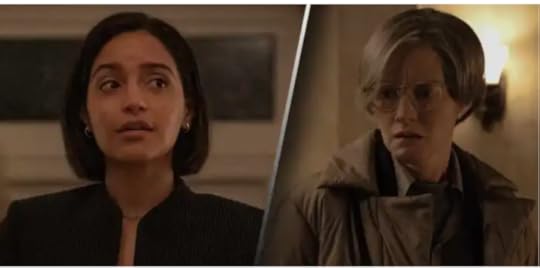
I usually focus on the alternate history flourishes in my reviews of For All Mankind, but the story of Aleida and Margot in episode 4.6, up on Apple TV+ today, was so good that I wanted to devote this review to that.
Aleida had realized last season that Margot, who had brought her into NASA, was working with the Russians. But that part of their relationship had come to a brutal end with the explosion at NASA headquarters. It did kill Molly Cobb, and Aleida thought it had taken Margot as well.
Of course it had not. Margot was already on her way to the Soviet Union, where she has gone to nearly being killed in prison to now serving as Irina's literally secret advisor. When there's a summit meeting in Leningrad (the title of this episode) to work out a plan to bring the iridium asteroid and its riches to Earth, Margot is literally talking from another room in Irina's ear, as she chairs a meeting in which Aleida is also present as the Helios representative. The meeting doesn't get too far, leaving Aleida frustrated, still wanting to talk, and the others rushing off to eat. This sets up the best scene in the episode.
Margot realizes that the combined space leaders of Earth won't be able to solve the immensely difficult problem of getting the iridium asteroid to Earth. She also realizes that she and Aleida, working together, could and would figure out what to do. The two meet. Margot expects Aleida to be furious at her for betraying NASA and US. Instead, Aleida hugs Margot, crying with joy at finding Margot alive. That's what I call realistic, subtle, and memorable writing.
After the long hug, Aleida then takes to berating her idol for betraying her country. And that's realistic, too. In the end, Aleida agrees to work with Margot to come up with a plan for the asteroid, setting up some good stories in the ongoing season and series.
All in all, a really satisfying episode that portrays how the impetus to get our species into space can transcend personal as well as national differences. A good portrayal, very well played by Wren Schmidt as Margo and Coral Peña as Aleida, in how there can still be some hope for humanity.
See also For All Mankind 4.1: Back in Business and Alternate Reality ... 4.2: The Fate of Gorbachev ... 4.3-4.4: The Soviet Union in the 21st Century, On Earth and Mars ... 4.5: Al Gore as President and AI
And see also For All Mankind 3.1: The Alternate Reality Progresses ... 3.2: D-Mail ... 3.3-3.4: The Race
And see also For All Mankind, Season 1 and Episode 2.1: Alternate Space Race Reality ... For All Mankind 2.2: The Peanut Butter Sandwich ... For All Mankind 2.3: "Guns to the Moon" ... For All Mankind 2.4: Close to Reality ... For All Mankind 2.5: Johnny and the Wrath of Kahn ... For All Mankind 2.6: Couplings ... For All Mankind 2.7: Alternate History Surges ... For All Mankind 2.8: Really Lost in Translation ... For All Mankind 2.9: Relationships ... For All Mankind 2.10: Definitely Not the End
Paul Levinson's books ... Paul Levinson's music
December 14, 2023
Who Killed JFK? Episode 6: The Richard Case Nagell Case

Episode 6 of the Who Killed JFK? podcast with Rob Reiner and Soledad O'Brien really hit paydirt with an account of Richard Case Nagell, given to Dick Russell, which provides the most convincing evidence I've heard so far that Lee Harvey was indeed a patsy, set up to take the fall for the assassination of JFK on November 22, 1963.
Who was Nagel? He was a CIA double agent -- same as Oswald (according to Russell and this podcast), tasked by the Soviets, whom he wasn't really working for, to kill Oswald. Why? Reiner and Russell explain that the Soviets knew of the CIA plan to kill Kennedy and blame it on them (the Soviets), as a pretext for the U. S. to then invade Cuba and once and for all get Castro out of power. Extensively interviewed by Russell over a period 20 years before Nagell's death from a "heart attack" in 1995, Russell tells us in the podcast (and in his 2003 book about Nagell, The Man Who Knew Too Much) that Nagell was ordered by the Soviets to kill Oswald to prevent the assassination of JFK. This put Nagell "between a rock and a hard place," as O'Brien aptly puts it. If he follows the Soviet orders and kills Oswald, the CIA will likely kill him. If he doesn't follow those orders, the Soviets will do the same. Nagell tries to let Oswald know he's being set up, without being too specific, because Nagell doesn't want to bring CIA down on him. Oswald shrugs him off. So in a move that seems crazy if you don't know any of this background, Nagell walks into a bank in Dallas two months before JFK's assassination, and fires a gun in the air, twice. He wants to get arrested, because he figures that prison is the safest place to be, with potentially CIA and Soviet assassins both apt to kill him.
The CIA does eventually get Nagell with a "heart attack gun" (not science fiction, check it out online) in 1995, one day after the Assassinations Records Review Board (established by Congress in the President John F. Kennedy Assassination Records Collection Act of 1992) sent Nagell a request for information. Fortunately for the truth, Nagell had already talked extensively with Russell in the preceding decades.
So where does this leave us? Well, as I said in reviews of earlier episodes of this podcast, it convinced me early on that, at very least, Lee Harvey Oswald was not the sole shooter in Dallas on November 22, 1963. I'm now convinced that Oswald was far more than not the only shooter that day: he was indeed the "patsy," as Oswald after the assassination said he was, in the murder intricately plotted and carried out by the CIA to punish JFK for his failure to provide support for the Bay of Pigs invasion, prevent him from furthering detente with the Soviet Union, and we can now add to provide a pretext for a US all-out attack on Cuba.
I'm looking forward more than ever to the next episodes in this crucially important podcast.
See also Who Killed JFK? A Review of the First Three Episodes of this Podcast ... Episode 4: The Real Manchurian Candidate ... Episode 5: Sheep Dipped
Paul Levinson's books ... Paul Levinson's musicDecember 12, 2023
Podcast Review of the Who Killed JFK podcast, Episodes 1-5
Welcome to Light On Light Through, Episode 364, in which I review the Who Killed JFK? podcast, episodes 1-5.
Read this review (written review of episode 5, with links to written reviews episodes 1-4)
Links to some of what I mentioned in the podcast:
my review of Jack Dann's Fiction Writer's Guide to Alternate History ... my podcast interview with Jack Dann my alternate history story about The BeatlesPaul Levinson's books ... Paul Levinson's music
Levinson at Large
- Paul Levinson's profile
- 340 followers


